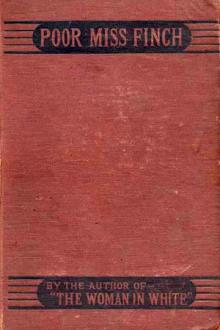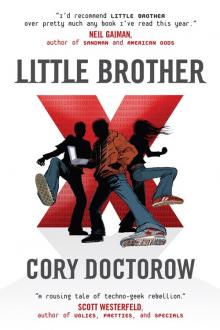Poor Miss Finch by Wilkie Collins (feel good novels txt) 📕

- Author: Wilkie Collins
- Performer: -
Book online «Poor Miss Finch by Wilkie Collins (feel good novels txt) 📕». Author Wilkie Collins
I looked up again. Oscar had stolen nearer; I could see his face plainly. The good influence of Lucilla was beginning to do its good work! I saw the tears rising in his eyes; I saw love and pity taking the place of hatred and revenge. The Oscar of my old recollections was standing before me once more!
“I don’t want to go away,” Lucilla went on; “I don’t want to leave him. All I ask for, is a little more time. Time must help me to get back again to my old self. My blind days have been the days of my whole life. Can a few weeks of sight have deprived me of the feelings which have been growing in me for years? I won’t believe it! I can find my way about the house; I can tell things by my touch; I can do all that I did in my blindness, just as well as ever, now I am blind again. The feeling for him will come back to me like the rest. Only give me time! only give me time!”
At the last word, she started to her feet in sudden alarm. “There is some one in the room,” she said. “Some one who is crying! Who is it?”
Oscar was close to us. The tears were falling fast over his cheeks—the one faint sobbing breath which had escaped him had caught my ear as well as Lucilla’s. I took his hand in one of my hands; and I took Lucilla’s hand in the other. For good or for evil, the result rested with God’s mercy. The time had come.
“Who is it?” Lucilla repeated impatiently.
“Try if you can tell, my love, without asking me.”
With those words, I put her hand in Oscar’s hand—and stood close, watching her face.
For one awful moment, when she first felt the familiar touch, the blood left her cheeks. Her blind eyes dilated fearfully. She stood petrified. Then, with a long low cry—a cry of breathless rapture—she flung her arms passionately round his neck. The life flowed back into her face; her lovely smile just trembled on her parted lips; her breath came faint and quick and fluttering. In soft tones of ecstasy, with her lips on his cheek, she murmured the delicious words:
“Oh, Oscar! I know you once more!”
A LITTLE interval of time elapsed.
Her first exquisite sense of the recognition by touch had passed away. Her mind had recovered its balance. She separated herself from Oscar, and turned to me, with the one inevitable question which I knew must follow the joining of their hands.
“What does it mean?”
The exposure of Nugent’s perfidy; the revelation of the fatal secret of Oscar’s face; and, last not least, the defence of my own conduct towards her, were all comprehended in the answer for which that question called. As carefully, as delicately, as mercifully as I could, I disclosed to her the whole truth. How the shock affected her, she did not tell me at the time, and has never told me since. With her hand in Oscar’s hand, with her face hidden on Oscar’s breast, she listened; not once interrupting me, from first to last, by so much as a single word. Now and then, I saw her tremble; now and then I heard her sigh heavily. That was all. It was only when I had ended—it was only after a long interval during which Oscar and I watched her in speechless anxiety—that she slowly lifted her head and broke the silence.
“Thank God,” we heard her say to herself fervently—“Thank God, I am blind.”
Those were her first words. They filled me with horror. I cried out to her to recall them.
She quietly laid her head back on Oscar’s breast.
“Why should I recall them?” she asked. “Do you think I wish to see him disfigured as he is now? No! I wish to see him—and I do see him!—as my fancy drew his picture in the first days of our love. My blindness is my blessing. It has given me back my old delightful sensation when I touch him; it keeps my own beloved image of him—the one image I care for—unchanged and unchangeable. You will persist in thinking that my happiness depends on my sight. I look back with horror at what I suffered when I had my sight—my one effort is to forget that miserable time. Oh, how little you know of me! Oh, what a shock it would be to me, if I saw him as you see him! Try to understand me, and you won’t talk of my loss—you will talk of my gain.”
“Your gain?” I repeated. “What have you gained?”
“Happiness,” she answered. “My life lives in my love. And my love lives in my blindness.”
There was the story of her whole existence—told in two words!
If you had seen her radiant face as she raised it again in the excitement of speaking; if you had remembered (as I remembered) what her surgeon had said of the penalty which she must inevitably pay for the recovery of her sight—how would you have answered her? It is barely possible, perhaps, that you might have done what I did. That is to say: You might have modestly admitted that she knew what the conditions of her happiness were better than you—and you might not have answered her at all!
I left them to talk together, and took a turn in the room, considering with myself what we were to do next.
It was not easy to say. The barren information which I had received from my darling was all the information that I possessed. Nugent had unflinchingly carried his cruel deception to its end. He had falsely given notice of his marriage at the church, in his brother’s name; and he was now in London, falsely obtaining his Marriage License, in his brother’s name also. So much I knew of his proceedings—and no more.
While I was still pondering, Lucilla cut the Gordian knot.
“Why are we stopping here?” she asked. “Let us go—and never return to this hateful place again!”
As she rose to her feet, we were startled by a soft knock at the door.
I answered the knock. The woman who had brought Lucilla to the hotel appeared once more. She seemed to be afraid to venture far from the door. Standing just inside the room, she looked nervously at Lucilla, and said, “Can I speak to you, Miss?”
“You can say anything you like, before this lady and gentleman,” Lucilla answered. “What is it?”
“I’m afraid we have been followed, Miss.”
“Followed? By whom?”
“By the lady’s maid. I saw her, a little while since, looking up at the hotel—and then she went back in a hurry on the way to the house—and that’s not the worse of it, Miss.”
“What else has happened?”
“We have made a mistake about the railway,” said the woman. “There’s a train from London that we didn’t notice in the timetable. They tell me downstairs it came in more than a quarter of an hour ago. Please to come back, Miss—or I fear we shall be found out.”
“You can go back at once, Jane,” said Lucilla.
“By myself?”
“Yes. Thank you for bringing me here—here I remain.”
She had barely taken her seat again between Oscar and me, before the door was softly opened from the outside. A long thin nervous hand stole in through the opening; took the servant by the arm; and drew her out into the passage. In her place, a man entered the room with his hat on. The man was Nugent Dubourg.
He stopped where the servant had stopped. He looked at Lucilla; he looked at his brother; he looked at me.
Not a word fell from him. There he stood, fronting the friend whom he had calumniated and the brother whom he had betrayed. There he stood—with his eyes fixed on Lucilla, sitting between us—knowing that it was all over; knowing that the woman for whom he had degraded himself, was a woman parted from him for ever. There he stood, in the hell of his own making—and devoured his torture in silence.
On his brother’s appearance, Oscar had risen, and had raised Lucilla with him. He now advanced a step towards Nugent, still holding to him his betrothed wife.
I followed them, eagerly watching his face. There was no fear in me now of what he might do. Lucilla’s blessed influence had found, and cast out, the lurking demon that had been hidden in him. With a mind attentive but not alarmed, I waited to see how he would meet the emergency that confronted him.
“Nugent!” he said, very quietly.
Nugent’s head drooped—he made no answer.
Lucilla, hearing Oscar pronounce the name, instantly understood what had happened. She shuddered with horror. Oscar gently placed her in my arms, and advanced again alone towards his brother. His face expressed the struggle in him of some subtly-mingling influences of love and anguish, of sorrow and shame. He recalled to me in the strangest manner my past experience of him, when he had first trusted me with the story of the Trial, and when he had told me that Nugent was the good angel of his life.
He went up to the place at which his brother was standing. In the simple, boyish way, so familiar to me in the bygone time, he laid his hand on his brother’s arm.
“Nugent!” he said. “Are you the same dear good brother who saved me from dying on the scaffold, and who cheered my hard life afterwards? Are you the same bright, clever, noble fellow that I was always so fond of, and so proud of?”
He paused, and removed his brother’s hat. With careful, caressing hand, he parted his brother’s ruffled hair over the forehead. Nugent’s head sank lower. His face was distorted, his hands were clenched, in the dumb agony of remembrance which that tender voice and that kind hand had set loose in him. Oscar gave him time to recover himself: Oscar spoke next to me.
“You know Nugent,” he said. “You remember when we first met, my telling you that Nugent was an angel? You saw for yourself, when he came to Dimchurch, how kindly he helped me; how faithfully he kept my secrets; what a true friend he was. Look at him—and you will feel, as I do, that we have misunderstood and misinterpreted him, in some monstrous way.” He turned again to Nugent. “I daren’t tell you,” he went on, “what I have heard about you, and what I have believed about you, and what vile unbrotherly thoughts I have had of being revenged on you. Thank God, they are gone! My dear fellow, I look back at them—now I see you—as I might look back at a horrible dream. How can I see you, Nugent, and believe that you have been false to me? You, a villain who has tried to rob poor Me of the only woman in the world who cares for me! You, so handsome and so popular, who may marry any woman you like! It can’t be. You have drifted innocently into some false position without knowing it. Defend





Comments (0)